- Home
- Clive Barker
Imajica 01 - The Fifth Dominion Page 2
Imajica 01 - The Fifth Dominion Read online
Page 2
Theresa left them to their business and retired to sit beside the cot. In part out of deference to the sleepers and in part from his own unease at saying aloud what was on his mind, Estabrook spoke in whispers.
"Did Chant tell you why I'm here?"
"Of course," said Pie. "You want somebody murdered." He pulled a pack of cigarettes from the breast pocket of his denim shirt and offered one to Estabrook, who declined with a shake of his head. "That is why you're here, isn't it?"
"Yes," Estabrook replied. "Only—"
"You're looking at me and thinking I'm not the one to do it," Pie prompted. He put a cigarette to his lips. "Be honest."
"You're not exactly as I imagined," Estabrook replied.
"So, this is good," Pie said, applying a light to the cigarette. "If I had been what you'd imagined, I'd look like an assassin, and you'd say I was too obvious."
"Maybe."
"If you don't want to hire me, that's fine. I'm sure Chant can find you somebody else. If you do want to hire me, then you'd better tell me what you need."
Estabrook watched the smoke drift up over the assassin's gray eyes, and before he could prevent himself he was telling his story, the rules he'd drawn for this exchange forgotten. Instead of questioning the man closely, concealing his own biography so that the other would have as little hold on him as possible, he spilled the tragedy in every unflattering detail. Several times he almost stopped himself, but it felt so good to be unburdened that he let his tongue defy his better judgment. Not once did the other man interrupt the litany, and it was only when a rapping on the door, announcing Chant's return, interrupted the flow that Estabrook remembered there was anyone else alive in the world tonight besides himself and his confessor. And by that time the tale was told.
Pie opened the door but didn't let Chant in. "We'll wander over to the car when we've finished," he told the driver. "We won't be long." Then he closed the door again and returned to the table. "Something more to drink?" he asked.
Estabrook declined, but accepted a cigarette as they talked on, Pie requesting details of Judith's whereabouts and movements, Estabrook supplying the answers in a monotone. Finally, the issue of payment. Ten thousand pounds, to be paid in two halves, the first upon agreement of the contract, the second after its completion.
"Chant has the money," Estabrook said.
"Shall we walk, then?" Pie said.
Before they left the trailer, Estabrook looked into the cot. "You have beautiful children," he said when they were out in the cold.
"They're not mine," Pie replied. "Their father died a year ago this Christmas."
"Tragic," Estabrook said.
"It was quick," Pie said, glancing across at Estabrook and confirming in his glance the suspicion that he was the orphan maker. "Are you quite certain you want this woman dead?" Pie said. "Doubt's bad in a business like this. If there's any part of you that hesitates—"
"There's none," Estabrook said. "I came here to find a man to kill my wife. You're that man."
"You still love her, don't you?" Pie said, once they were out and walking.
"Of course I love her," Estabrook said. "That's why I want her dead."
"There's no Resurrection, Mr. Estabrook. Not for you, at least."
"It's not me who's dying," he said.
"I think it is," came the reply. They were at the fire, now untended. "A man kills the thing he loves, and he must die a little himself. That's plain, yes?"
"If I die, I die," was Estabrook's response. "As long as she goes first. I'd like it done as quickly as possible."
"You said she's in New York. Do you want me to follow her there?"
"Are you familiar with the city?"
"Yes."
"Then do it there and do it soon. I'll have Chant supply extra funds to cover the flight. And that's that. We shan't see each other again."
Chant was waiting at the perimeter and fished the envelope containing the payment from his inside pocket. Pie accepted it without question or thanks, then shook Estabrook's hand and left the trespassers to return to the safety of their car. As he settled into the comfort of the leather seat, Estabrook realized the palm he'd pressed against Pie's was trembling. He knitted its fingers with those of his other hand, and there they remained, white-knuckled, for the length of the journey home.
2
DO THIS FOR THE WOMEN OF THE WORLD, read the note John Furie Zacharias held. Slit your lying throat.
Beside the note, lying on the bare boards, Vanessa and her cohorts (she had two brothers; it was probably they who'd come with her to empty the house) had left a neat pile of broken glass, in case he was sufficiently moved by her entreaty to end his life there and then. He stared at the note in something of a stupor, reading it over and over, looking—vainly, of course—for some small consolation in it. Beneath the tick and scrawl that made her name, the paper was lightly wrinkled. Had tears fallen there while she'd written her goodbye, he wondered? Small comfort if they had, and a smaller likelihood still. Vanessa was not one for crying. Nor could he imagine a woman with the least ambiguity of feeling so comprehensively stripping him of possessions. True, neither the mews house nor any stick of furniture in it had been his by law, but they had chosen many of the items together—she relying upon his artist's eye, he upon her money to purchase whatever his gaze admired. Now it was all gone, to the last Persian rug and Deco lamp. The home they'd made together, and enjoyed for a year and two months, was stripped bare. And so indeed was he: to the nerve, to the bone. He had nothing.
It wasn't calamitous. Vanessa hadn't been the first woman to indulge his taste in handmade shirts and silk waistcoats, nor would she be the last. But she was the first in recent memory—for Gentle the past had a way of evaporating after about ten years—who had conspired to remove everything from him in the space of half a day. His error was plain enough. He'd woken that morning, lying beside Vanessa with a hard-on she'd wanted him to pleasure her with, and had stupidly refused her, knowing he had a liaison with Marline that afternoon. How she'd discovered where he was unloading his balls was academic. She had, and that was that. He'd stepped out of the house at noon, believing the woman he'd left was devoted to him, and come home five hours later to find the house as it was now. He could be sentimental at the strangest times. As now, for instance, wandering through the empty rooms, collecting up the belongings she had felt obliged to leave for him: his address book, the clothes he'd bought with his own money as opposed to hers, his spare spectacles, his cigarettes. He hadn't loved Vanessa, but he had enjoyed the fourteen months they'd spent together here. She'd left a few more pieces of trash on the dining room floor, reminders of that time: a cluster of keys they'd never found doors to fit, instruction documents for a blender he'd burned out making midnight margaritas, a plastic bottle of massage oil. All in all, a pitiful collection, but he wasn't so self-deceiving as to believe their relationship had been much more than a sum of those parts. The question was—now that it was over—where was he to go and what was he to do? Martine was a middle-aged married woman, her husband a banker who spent three days of every week in Luxembourg, leaving her time to philander. She professed love for Gentle at intervals, but not with sufficient consistency to make him think he could prize her from her husband, even if he wanted to, which he was by no means certain he did. He'd known her eight months—met her, in fact, at a dinner party hosted by Vanessa's elder brother, William—and they had only argued once, but it had been a telling exchange. She'd accused him of always looking at other women; looking, looking, as though for the next conquest. Perhaps because he didn't care for her too much, he'd replied honestly and told her she was right. He was stupid for her sex. Sickened in their absence, blissful in their company: love's fool. She'd replied that while his obsession might be healthier than her husband's—which was money and its manipulation—his behavior was still neurotic. Why this endless hunt? she'd asked him. He'd answered with some folderol about seeking the ideal woman, but he'd known the truth even as
he was spinning her this tosh, and it was a bitter thing. Too bitter, in fact, to be put on his tongue. In essence, it came down to this: he felt meaningless, empty, almost invisible unless one or more of her sex were doting on him. Yes, he knew his face was finely made, his forehead broad, his gaze haunting, his lips sculpted so that even a sneer looked fetching on them, but he needed a living mirror to tell him so. More, he lived in hope that one such mirror would find something behind his looks only another pair of eyes could see: some undiscovered self that would free him from being Gentle.
As always when he felt deserted, he went to see Chester Klein, patron of the arts by diverse hands, a man who claimed to have been excised by fretful lawyers from more biographies than any other man since Byron. He lived in Notting Hill Gate, in a house he'd bought cheaply in the late fifties, which he now seldom left, touched as he was by agoraphobia or, as he preferred it, "a perfectly rational fear of anyone I can't blackmail."
From this small dukedom he managed to prosper, employed as he was in a business which required a few choice contacts, a nose for the changing taste of his market, and an ability to conceal his pleasure at his achievements. In short, he dealt in fakes, and it was this latter quality he was most deficient in. There were those among his small circle of intimates who said it would be his undoing, but they or their predecessors had been prophesying the same for three decades, and Klein had outprospered every one of them. The luminaries he'd entertained over the decades—the defecting dancers and minor spies, the addicted debutantes, the rock stars with messianic leanings, the bishops who made idols of barrow boys—they'd all had their moments of glory, then fallen. But Klein went on to tell the tale. And when, on occasion, his name did creep into a scandal sheet or a confessional biography, he was invariably painted as the patron saint of lost souls.
It wasn't only the knowledge that, being such a soul, Gentle would be welcomed at the Klein residence, that took him there. He'd never known a time when Klein didn't need money for some gambit or other, and that meant he needed painters. There was more than comfort to be found in the house at Ladbroke Grove; there was employment. It had been eleven months since he'd seen or spoken to Chester, but he was greeted as effusively as ever and ushered in.
"Quickly! Quickly!" Klein said. "Gloriana's in heat again!" He managed to slam the door before the obese Gloriana, one of his five cats, escaped in search of a mate. "Too slow, sweetie!" he told her. She yowled at him in complaint. "I keep her fat so she's slow," he said. "And I don't feel so piggy myself."
He patted a paunch that had swelled considerably since Gentle had last seen him and was testing the seams of his shirt, which, like him, was florid and had seen better years. He still wore his hair in a ponytail, complete with ribbon, and wore an ankh on a chain around his neck, but beneath the veneer of a harmless flower child gone to seed he was as acquisitive as a bowerbird. Even the vestibule in which they embraced was overflowing with collectibles: a wooden dog, plastic roses in psychedelic profusion, sugar skulls on plates.
"My God, you're cold," he said to Gentle. "And you look wretched. Who's been beating you about the head?"
"Nobody."
"You're bruised."
"I'm tired, that's all."
Gentle took off his heavy coat and laid it on the chair by the door, knowing when he returned it would be warm and covered with cat hairs. Klein was already in the living room, pouring wine. Always red.
"Don't mind the television," he said. "I never turn it off these days. The trick is not to turn up the sound. It's much more entertaining mute."
This was a new habit, and a distracting one. Gentle accepted the wine and sat down in the corner of the ill-sprung couch, where it was easiest to ignore the demands of the screen. Even there, he was tempted.
"So now, my Bastard Boy," Klein said, "to what disaster do I owe the honor?"
"It's not really a disaster. I've just had a bad time. I wanted some cheery company."
"Give them up. Gentle," Klein said.
"Give what up?"
"You know what. The fair sex. Give them up. I have. It's such a relief. All those desperate seductions. All that time wasted meditating on death to keep yourself from coming too soon. I tell you, it's like a burden gone from my shoulders."
"How old are you?"
"Age has got fuck-all to do with it. I gave up women because they were breaking my heart."
"What heart's that?"
"I might ask you the same thing. Yes, you whine and you wring your hands, but then you go back and make the same mistakes. It's tedious. They're tedious."
"So save me."
"Oh, now here it comes."
"I don't have any money."
"Neither do I."
"So we'll make some together. Then I won't have to be a kept man. I'm going back to live in the studio, Klein. I'll paint whatever you need."
"The Bastard Boy speaks."
"I wish you wouldn't call me that."
"It's what you are. You haven't changed in eight years. The world grows old, but the Bastard Boy keeps his perfection. Speaking of which—"
"Employ me."
"Don't interrupt me when I'm gossiping. Speaking of which, I saw Clem the Sunday before last. He asked after you. He's put on a lot of weight. And his love life's almost as disastrous as yours. Taylor's sick with the plague. I tell you, Gentle, celibacy's the thing."
"So employ me."
"It's not as easy as that. The market's soft at the moment. And, well, let me be brutal: I have a new wunder-kind." He got up. "Let me show you." He led Gentle through the house to the study. 'The fellow's twenty-two, and I swear if he had an idea in his head he'd be a great painter. But he's like you; he's got the talent but nothing to say."
"Thanks," said Gentle sourly.
"You know it's true." Klein switched on the light. There were three canvases, all unframed, in the room. One, a nude woman after the style of Modigliani. Beside it, a small landscape after Corot. But the third, and largest of the three, was the coup. It was a pastoral scene, depicting classically garbed shepherds standing, in awe, before a tree in the trunk of which a human face was visible.
"Would you know it from a real Poussin?"
"Is it still wet?" Gentle asked.
"Such a wit."
Gentle went to give the painting a more intimate examination. This period was not one he was particularly expert in, but he knew enough to be impressed by the handiwork. The canvas was a close weave, the paint laid upon it in careful regular strokes, the tones built up, it seemed, in glazes.
"Meticulous, eh?" said Klein.
"To the point of being mechanical."
"Now, now, no sour grapes."
"I mean it. It's just too perfect for words. You put this in the market and the game's up. Now, the Modigliani's another matter—"
"That was a technical exercise," Klein said. "I can't sell that. The man only painted a dozen pictures. It's the Poussin I'm betting on."
"Don't. You'll get stung. Mind if I get another drink?"
Gentle headed back through the house to the lounge, Klein following, muttering to himself.
"You've got a good eye. Gentle," he said, "but you're unreliable. You'll find another woman and off you'll go."
"Not this time."
"And I wasn't kidding about the market. There's no room for bullshit."
"Did you ever have a problem with a piece I painted?"
Klein mused on this. "No," he admitted.
"I've got a Gauguin in New York. Those Fuseli sketches I did—"
"Berlin. Oh, yes, you've made your little mark."
"Nobody's ever going to know it, of course."
"They will. In a hundred years' time your Fuselis will look as old as they are, not as old as they should be. People will start to investigate, and you, my Bastard Boy, will be discovered. And so will Kenny Soames and Gideon: all my deceivers."
"And you'll be vilified for bribing us. Denying the twentieth century all that originality."
"That's what I'll do, then. Virgins in any style. I'll be celibate, and I'll paint Madonnas all day. With child. Without child. Weeping. Blissful. I'll work my balls off, Kleiny, which'll be fine because I won't need them."
"Forget the Virgins. They're out of fashion."
"They're forgotten."
"Decadence is your strongest suit."
"Whatever you want. Say the word."
"But don't fuck with me. If I find a client and promise something to him, it's up to you to produce it."
"I'm going back to the studio tonight. I'm starting over. Just do one thing for me?"
"What's that?"
"Burn the Poussin."
He had visited the studio on and off through his time with Vanessa—he'd even met Marline there on two occasions when her husband had canceled a Luxembourg trip and she'd been too heated to miss a liaison—but it was charmless and cheerless, and he'd returned happily to the house in Wimpole Mews. Now, however, he welcomed the studio's austerity. He turned on the little electric fire, made himself a cup of fake coffee with fake milk, and, under its influence, thought about deception.

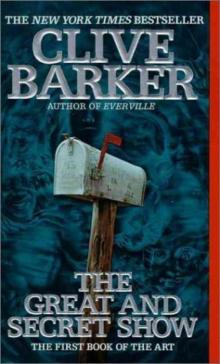 The Great and Secret Show
The Great and Secret Show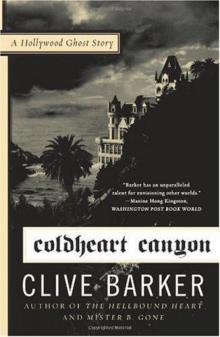 Coldheart Canyon: A Hollywood Ghost Story
Coldheart Canyon: A Hollywood Ghost Story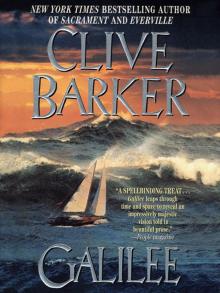 Galilee
Galilee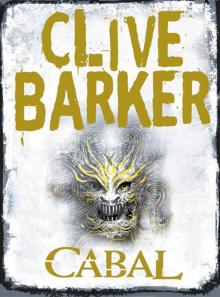 Cabal
Cabal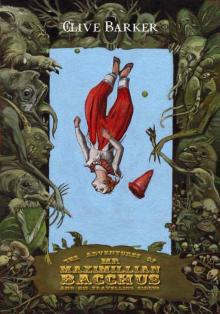 The Adventures of Mr. Maximillian Bacchus and His Travelling Circus
The Adventures of Mr. Maximillian Bacchus and His Travelling Circus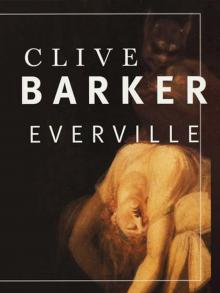 Everville
Everville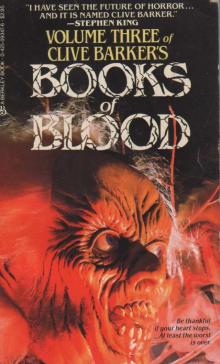 Books of Blood: Volume Three
Books of Blood: Volume Three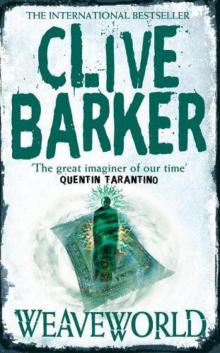 Weaveworld
Weaveworld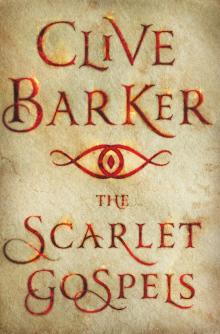 The Scarlet Gospels
The Scarlet Gospels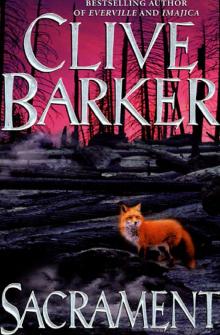 Sacrament
Sacrament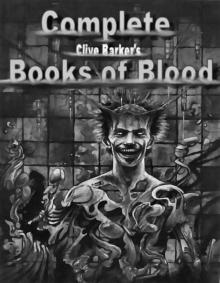 Books of Blood: Volumes 1-6
Books of Blood: Volumes 1-6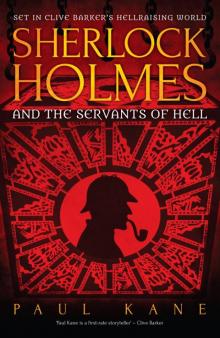 Sherlock Holmes and the Servants of Hell
Sherlock Holmes and the Servants of Hell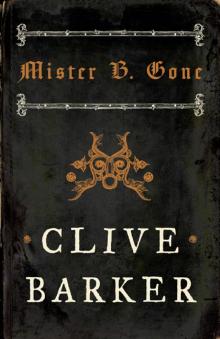 Mister B. Gone
Mister B. Gone Imajica
Imajica The Reconciliation
The Reconciliation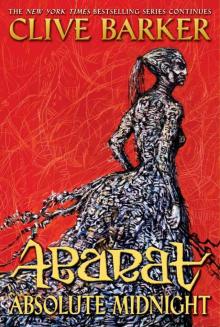 Abarat
Abarat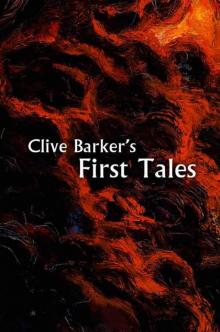 Clive Barker's First Tales
Clive Barker's First Tales The Hellbound Heart
The Hellbound Heart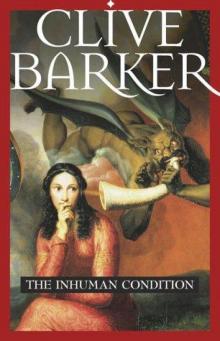 The Inhuman Condition
The Inhuman Condition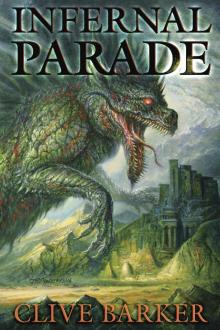 Infernal Parade
Infernal Parade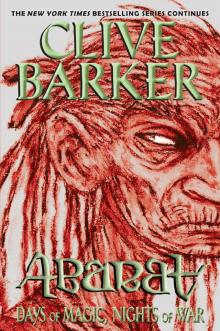 Days of Magic, Nights of War
Days of Magic, Nights of War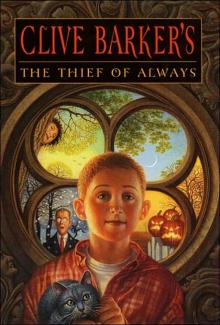 The Thief of Always
The Thief of Always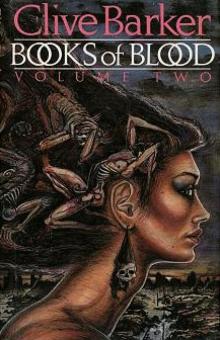 Books of Blood Vol 2
Books of Blood Vol 2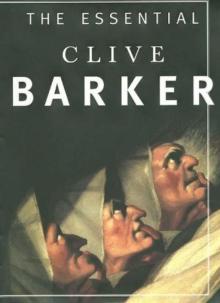 The Essential Clive Barker
The Essential Clive Barker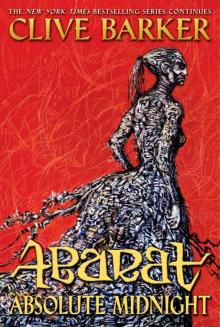 Abarat: Absolute Midnight a-3
Abarat: Absolute Midnight a-3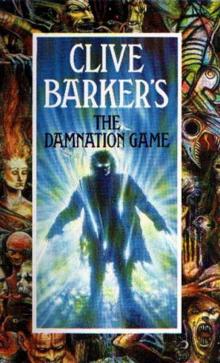 The Damnation Game
The Damnation Game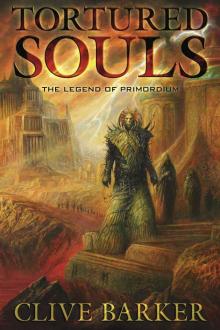 Tortured Souls: The Legend of Primordium
Tortured Souls: The Legend of Primordium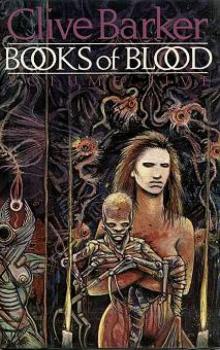 Books of Blood Vol 5
Books of Blood Vol 5 Imajica 02 - The Reconciliator
Imajica 02 - The Reconciliator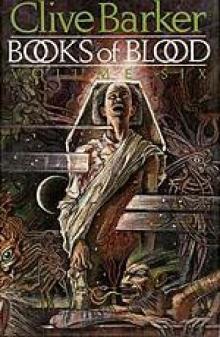 Books Of Blood Vol 6
Books Of Blood Vol 6 Imajica 01 - The Fifth Dominion
Imajica 01 - The Fifth Dominion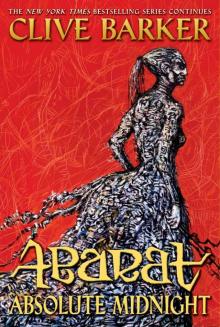 Abarat: Absolute Midnight
Abarat: Absolute Midnight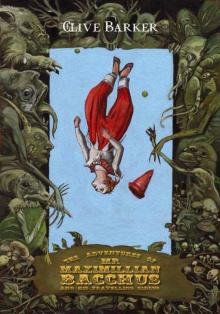 The Adventures of Mr. Maximillian Bacchus & His Traveling Circus
The Adventures of Mr. Maximillian Bacchus & His Traveling Circus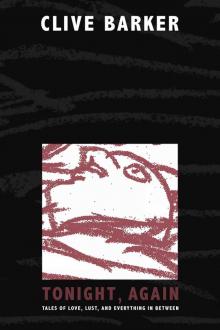 Tonight, Again
Tonight, Again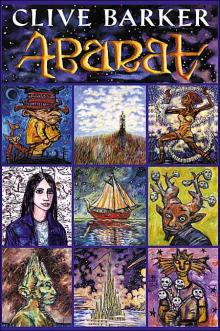 Abarat: The First Book of Hours a-1
Abarat: The First Book of Hours a-1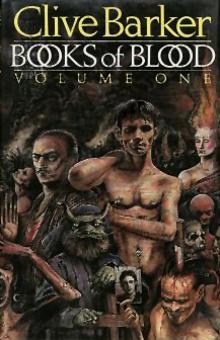 Books Of Blood Vol 1
Books Of Blood Vol 1 Age of Desire
Age of Desire Imajica: Annotated Edition
Imajica: Annotated Edition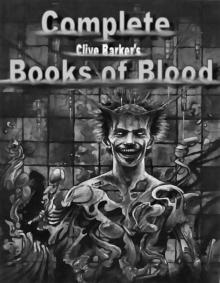 Complete Books of Blood
Complete Books of Blood Gutted: Beautiful Horror Stories
Gutted: Beautiful Horror Stories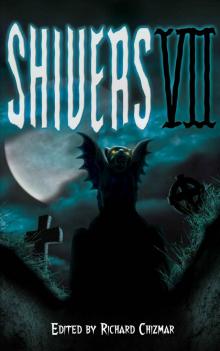 Shivers 7
Shivers 7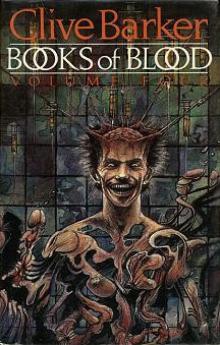 Books Of Blood Vol 4
Books Of Blood Vol 4